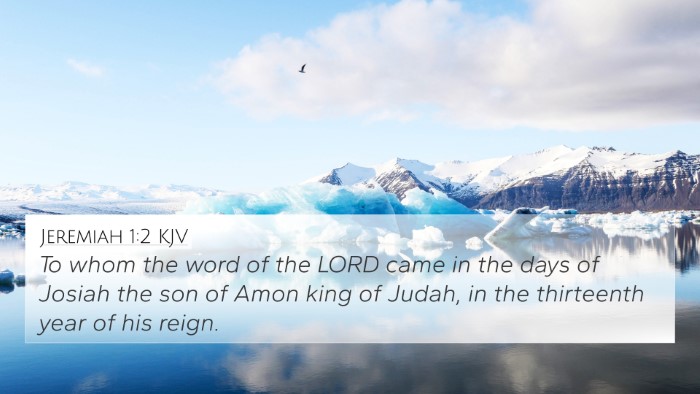Understanding Jeremiah 16:1
The verse Jeremiah 16:1 reads:
"The word of the LORD came also unto me, saying,"
This verse introduces a critical moment in the prophetic ministry of Jeremiah. It signifies the direct communication between God and His chosen messenger, allowing readers to glimpse the divine guidance that Jeremiah received, which was important for his mission to the people of Judah.
Contextual Significance
To fully grasp the meaning of Jeremiah 16:1, it is essential to understand the broader context:
- Historical Background: At this time, Judah was facing impending judgment due to its persistent idolatry and abandonment of God's commandments.
- Jeremiah's Role: As a prophet, Jeremiah had a unique responsibility to convey God’s messages, even when they were unwelcome.
- Theological Implications: The phrase "the word of the LORD" emphasizes the divine origin of Jeremiah's message and its authority.
Commentary Insights
Insights from notable public domain commentaries illuminate this verse:
- Matthew Henry: Henry emphasizes that this phrase indicates not only the word spoken but also the impending seriousness of the messages that follow. He suggests that Jeremiah's messages serve as warnings to the people.
- Albert Barnes: Barnes points out that this initiation of communication signifies God’s ongoing concern for His people. The weight of the upcoming messages is highlighted as a call to repentance.
- Adam Clarke: Clarke notes the significance of God's communication with His prophets, underlining that having a direct word from God is a solemn and authoritative matter, calling attention to the importance of the prophet's role in conveying God’s will.
Bible Verse Cross-References
To deepen understanding, here are several Bible verses that relate to Jeremiah 16:1:
- Jeremiah 1:4-5: "Then the word of the LORD came unto me, saying, Before I formed thee in the belly I knew thee."
- Ezekiel 2:7: "And thou shalt speak my words unto them, whether they will hear, or whether they will forbear."
- Amos 3:7: "Surely the Lord GOD will do nothing, but he revealeth his secret unto his servants the prophets."
- Revelation 1:1: "The revelation of Jesus Christ, which God gave unto him, to shew unto his servants things which must shortly come to pass."
- Isaiah 6:8: "Also I heard the voice of the Lord, saying, Whom shall I send, and who will go for us?"
- Job 33:14: "For God speaketh once, yea twice, yet man perceiveth it not."
- Hebrews 1:1-2: "God, who at sundry times and in divers manners spake in time past unto the fathers by the prophets, hath in these last days spoken unto us by his Son."
Thematic Bible Verse Connections
Jeremiah 16:1 can be explored in connection with broader biblical themes:
- Prophetic Calling: The calling and commissioning of prophets like Jeremiah point to God's method of communication.
- Judgment and Repentance: The urgent need for repentance highlighted throughout Scripture echoes Jeremiah’s warning.
- Divine Communication: The idea of God speaking to His people, particularly through chosen prophets, is a recurring theme in the Bible.
Application for Today
Understanding Jeremiah 16:1 encourages modern readers to:
- Recognize the importance of listening to God's messages through Scripture and prayer.
- Understand the ongoing relevance of prophetic voices in today’s context.
- Reflect on the call to moral and spiritual accountability as seen in Jeremiah’s messages.
Conclusion
In summary, Jeremiah 16:1 serves as a powerful introduction to a significant prophetic message, highlighting God's desire to communicate and call His people to repentance. Through careful cross-referencing and thematic exploration, we gain deeper insights into the nature of God’s communication and the role of the prophet. Engaging with this verse and its connections enriches our understanding of Scripture and invites us to respond to God's call actively.





